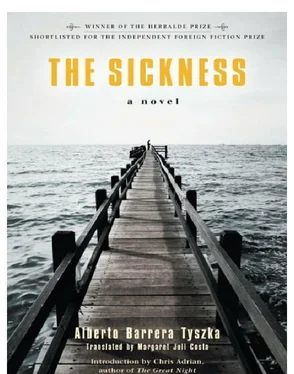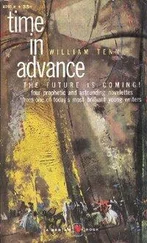At last, she speaks. She does so hesitantly, almost sadly, but without disguising what she feels, without hiding what she thinks. Merny doesn’t like the idea of working for a man who is about to die. It’s nothing personal, she just doesn’t want to be in the apartment when, inevitably, Javier Miranda passes away. That, at any rate, is what Andrés deduces. She doesn’t say as much, of course. She utters sighs more than words. She converses in vague sounds, interjections, thoughtful pauses. In the end, she says that she’ll think about it. That’s all. She’ll think about it.
“I’ll tell you later. Now I’ve got to finish cleaning the bathroom.”
Dear Dr. Miranda,
I have a confession to make: I’m following you. I’d love to see your face now, to see your reaction. What do you think? Does it bother you? Does it worry you? Does it frighten you perhaps? Or maybe you don’t even care, perhaps you even find it amusing. I no longer know what to think. Let me just make it clear that I haven’t begun following you because I want to, but out of sheer desperation. I’ve tried everything, but you don’t answer my e-mails, your secretary lies to me, and I don’t know how else to get you to listen to me, to resolve my situation.
Now I think that perhaps this is the only way to make you understand how hounded I feel, how all this is affecting me. I’m even starting to have problems at work. I’m beginning to think they might fire me. I mean it. The attacks are getting ever more frequent, and every time that I feel I’m about to faint, and my blood pressure plummets, I usually try and get to the restroom quickly. I splash my face with cold water and breathe deeply. Sometimes, too, I do a quick handstand, like we used to in gym lessons at school. I support myself on my hands and rest my feet against the wall. That way the blood flows back into my head and I know then I won’t faint.
A little while ago, a supervisor came up to me with a strange smile on his face and said that a rumor was going around that, lately, I spend most of my time in the bathroom. Another day, I was doing a handstand, as I’ve explained, and a colleague from the next office came in. Needless to say, he was very surprised to find me there like that. I tried to explain the situation to him, but I’m sure he didn’t believe me. Perhaps he thought I was mad. The truth is I feel more and more uncomfortable at work. I can tell they’re talking about me, and they look at me suspiciously. I know that when they see me, they nudge each other and whisper.
The day before yesterday, Doctor, I could bear it no longer. I took advantage of the fact that the office was being fumigated and left early to look for you. I know you only see patients from three o’clock in the afternoon, but I thought perhaps you might be engaged on some other activity at the hospital. I thought you might be visiting your patients or performing an operation. I wandered about all over the place, I even went to the coffee bar. I also asked a couple of nurses if they’d seen you. I didn’t find you, but I have to say that just being there, looking for you, made me feel better.
Then, just when I was about to come home, I spotted you in the distance, on the ground floor. I was walking along and there you were at the far end of the corridor, about to get into one of the elevators that go down to the parking lot. I walked as fast as I could to try and reach you, but I was too slow. By the time I got there, the elevator doors had closed. I felt quite desperate then. And I raced for the stairs, the way people do in films. I tore down them, I even bumped into a lady with a walking stick, but carried on regardless. It was almost a race against the clock: as you know, there are five levels in the underground garage. How could I possibly know where you’d parked your car? How could I possibly know at which level you would get out of the elevator? That’s why I ran down the stairs, almost two at a time, peering in at every level, trying to catch you, trying to see if I might spot you. You were wearing a pale green shirt and blue trousers.
I didn’t find you. I never saw you. I reached level five gasping for breath. The lift doors opened and out came a woman carrying a little girl in her arms. The child had her head in bandages and was very pale. Her lips looked as if they had been painted green. When she saw me, the woman took fright and hurried off to where the cars were parked. I stayed there for a while to get my breath back. Then I started thinking about what would have happened if I’d managed to catch up to you. How would you have reacted? Would you have recognized me at once? Would you know who I was?
I spent the afternoon feeling oddly relieved. Perhaps it’s the same relief I feel when I send you these letters.
Knowing that we’re sure to meet again soon,
Ernesto Durán
He takes the afternoon off. He phones his secretary and cancels all his appointments. Then he goes to Maripérez station and gets the cable car. It’s a weekday, so he doesn’t have to wait long. The only other people in the queue are some boys, playing hooky, escaping from that organized tedium known as high school. They spend the whole ride laughing and joking. Andrés says nothing. One of his own kids might skip school one Wednesday to form part of just such a group. They guffaw loudly. One of them has bought a pack of cigarettes. They’re probably planning to smoke them on top of El Ávila. They’re about thirteen or fourteen. Andrés considers talking to them, telling them he’s a doctor, warning them about the dangers of smoking. Smoking kills, even when you’re only fifteen, he could say. But he doesn’t. There’s no point. He was that age once, he’s been there. Adolescence is the most unclassifiable of joys.
It’s been far too long since Andrés has been up to the top of that mountain. There was a time, in his youth, when he would come whenever he could. El Ávila was like nature’s shopping mall, with few if any regulations, and instead of shop windows, there were dark, mysterious corridors full of nettles, lots of paths you could get lost down. Andrés and Vicente, his best friend at the time, used to go there every week. They even made the climb on foot sometimes. They could take any route: La Julia, Quebrada Pajaritos, Cotiza, even, when they were feeling really adventurous, reaching the peak of Naiguatá, the highest point on the coastal mountain range. They used to sit there on a huge rock. If there were no clouds, you could see the city of Caracas on one side and the sea on the other. They would sit there talking nonsense and smoking marijuana. This was no mere diversion for Vicente, a weekend spliff; he devoted himself with real seriousness to organizing this ritual. He took almost a professional pride in it. He used to get hold of all kinds of different stuff. Once, he turned up with some really high-quality Jamaican weed. They smoked their respective joints and stretched out on the rocks, gazing up at the sky. They spent hours like that, not even talking, a faint, foolish smile on their lips.
The light is whiter up there. The sun is like a slap in the face. It burns differently, it spreads itself, as if it, too, were lying stretched out in the upper air. The wind cuts your lips. Its fingers are like razor blades. They didn’t so much climb the mountain as float on it.
The last he heard of Vicente was that he was living near Tampa, Florida, selling vacuum cleaners. It didn’t seem possible that the university timetable could have put asunder what marijuana had so forcefully joined together. Vicente was the brother Andrés never had. When Andrés began studying medicine, Vicente had just started his degree in engineering. They simply stopped seeing each other, and the process seemed so natural that it even occurred to Andrés that their friendship had merely been another subject on the high school curriculum. Just as he had got through math, through the indescribable tedium of Spanish and the apathy of history, so he had got through his friendship with Vicente. Years later, while queuing up to see a film, he met one of his erstwhile friend’s brothers, who told him that Vicente had moved to the States, where he lived a comfortable enough life, an Electrolux life, with his wife and three kids.
Читать дальше












